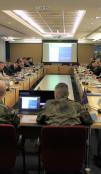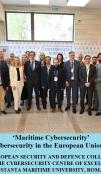Cyberspace – training Ukrainian IT specialists

Destroyed cities, minefields, trenches – the effects of the war in Ukraine are taking a toll on the country and its people. However, not all combat in this war leaves traces that can be seen at first glance. Some of it is taking place in silence and almost invisible to the outside world, although the repercussions can sometimes be felt across the country’s borders. In cyberspace, Ukrainian soldiers are engaged in a daily struggle to maintain the military's command and control (C2) capability, protect secret information and prevent attacks on critical infrastructure. But what role does all this play in the war in Ukraine and how does the EUMAM UA training mission prepare Ukrainian military personnel to become IT administrators?
Back to the beginning
23 February 2022: In Russia, Belarus and Crimea, Russian troops are preparing for the attack. In a few hours, the images of the invasion will make headlines all around the world. On the internet, meanwhile, the war has already begun. In order to weaken the C2 capability of the Ukrainian military, malware was launched several hours prior to the first attack, a step that was intended to disrupt the military’s communication networks, among other things. Conducting cyberattacks as part of military operations is an established practice in the Russia-Ukraine war and it helps significantly increase the effectiveness of attacks.
Especially since the annexation of Crimea in February 2014, Russia has increasingly conducted cyberattacks against Ukrainian networks. By now, Ukraine has significantly strengthened the security and resilience of important networks with the aid of civilian and military allies. While this has made it possible to counter numerous cyberattacks, these continue to pose a serious threat nevertheless. In military networks, intruders may not only gather sensitive data but also disrupt important communication channels. Since the start of the EUMAM UA training mission, Ukrainian soldiers have therefore regularly been sent to Germany to be trained by Bundeswehr IT specialists.
The Training
A rainy day in a barracks in Germany. But the Ukrainian military personnel hardly notice the weather because they are focusing on their screens. The silence in the classroom is only broken by the sound of typing on the keyboards and occasional instructions from the training personnel. Within several weeks, the participants learn skills such as the basics of establishing and operating a secure network.
The members of the training group repeatedly set up networks of varying complexity or have to rectify malfunctions that have been injected. The participants also practise securing connections by means of different VPN solutions. These skills are an essential factor in ensuring the C2 capability of the Ukrainian military. As is the case in other training courses of this mission, it is particularly the heterogeneity of the training group that proves challenging to the training personnel. “On the one hand, we are dealing with experienced IT personnel who are already proficient in many techniques, on the other, we have soldiers with little to no prior IT experience. Therefore, we have to re-plan and adapt lessons and practical training units every day to give the participants exactly the training they need,” explains one instructor. Once they have completed the training, the participants will return to their home country as IT administrators and support the Ukrainian military with their important skills.
While the main purpose of training Ukrainian IT soldiers is to support Ukraine in its fight against Russia, the training course also presents an opportunity to learn from Ukraine’s experience in this war. For the first time, it is possible to understand in real time how the provision of IT services affects the course of a war. The provision of information will most likely have a significant impact on future warfare, especially in combat operations between countries that are at roughly the same level of technological development. Therefore, the exchange of experience and methods is a decisive factor in providing a secure IT infrastructure and protecting it against attacks.
By EUMAM UA, ST-C Public Affairs / Lea Bacherle





